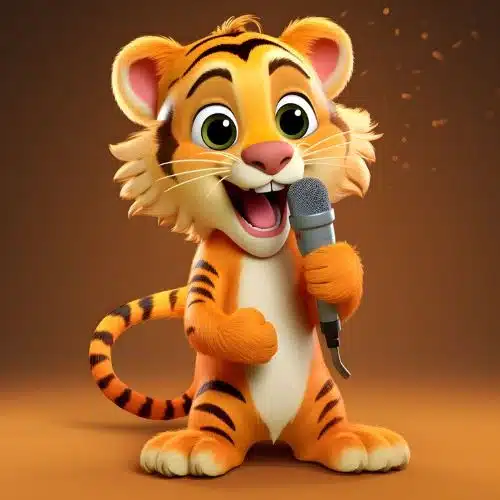Why Should Kids Learn Animal Sounds?
Understanding the sounds animals make not only enhances a child’s knowledge of the natural world but also promotes cognitive development, empathy, and a sense of wonder.
In this blog post, we will embark on an exciting journey with a curious kid and their mentor, as they explore the sounds made by various animals. Through a series of dialogues, we will discover how different animals communicate and learn how to incorporate these sounds into simple sentences. So, let’s dive into the fascinating world of animal sounds!
Exploring the Sounds of Animals: A Dialogue Between a Curious Kid and a Knowledgeable Mentor
In a cozy classroom filled with colorful posters and eager young minds, we find Mr. Anderson, a passionate teacher known for his love of animals and nature. Today, he is about to embark on an exciting journey with his curious student, Emily, a bright and inquisitive girl with a thirst for knowledge. As the morning sun streams through the windows, Mr. Anderson begins the day’s lesson on the captivating sounds of animals.
Mr. Anderson: Good morning, class! Today, we are going to explore the wonderful world of animal sounds. Have you ever wondered how animals communicate with each other? Well, get ready to dive into this fascinating topic!
Continue Reading Sounds Of Animals Below >>
Aarav: Mr. Anderson, what sound does a cat make?
Mr. Anderson: A cat meows. Now, tell me how you would use it in a sentence.
Aarav: The cat was crying “Meow Meow” for milk.
Aanya: Mr. Anderson, how does a dog sound?
Mr. Anderson: A dog barks. Can you create a sentence using this sound?
Aanya: The dog barked loudly when the mailman arrived.
Continue Reading Sounds Of Animals Below >>
Arjun: Mr. Anderson, what sound does a cow make?
Mr. Anderson: A cow mooes. Can you make a sentence with this sound?
Arjun: The cow mooed softly as it grazed in the field.
Continue Reading Sounds Of Animals Below >>
Diya: Mr. Anderson, how does a horse sound?
Mr. Anderson: A horse neighs. Now, can you use this sound in a sentence?
Diya: The horse neighed happily when it saw its owner.
Ishaan: Mr. Anderson, what sound does a bird make?
Mr. Anderson: A bird chirps. Can you create a sentence using this sound?
Ishaan: The bird chirped melodiously in the morning.
Meera: Mr. Anderson, how does a duck sound?
Mr. Anderson: A duck quacks. Can you create a sentence using this sound?
Meera: The duck quacked happily while swimming in the pond.
Nisha: Mr. Anderson, what sound does a snake make?
Mr. Anderson: A snake hisses. Can you make a sentence with this sound?
Nisha: The snake hissed warningly when I approached a frog.
Rahul: Mr. Anderson, how does a sheep sound?
Mr. Anderson: A sheep bleats. Now, can you use this sound in a sentence?
Rahul: The sheep bleated softly in the meadow.
Riya: Mr. Anderson, what sound does a monkey make?
Mr. Anderson: A monkey chatters. Can you create a sentence using this sound?
Riya: The monkey chattered excitedly while swinging from tree to tree.
Rohan: Mr. Anderson, how does a pig sound?
Mr. Anderson: A pig oinks. Can you make a sentence with this sound?
Rohan: The pig oinked happily when it found food.
Sanaya: Mr. Anderson, what sound does a bee make?
Mr. Anderson: A bee buzzes. Now, can you use this sound in a sentence?
Sanaya: The bee buzzed around the flowers in the garden.
Zara: Mr. Anderson, how does a mouse sound?
Mr. Anderson: A mouse squeaks. Can you create a sentence using this sound?
Zara: The mouse squeaked in fear when it saw the cat.
Siddharth: Mr. Anderson, what sound does a rooster make?
Mr. Anderson: A rooster crows. Can you make a sentence with this sound?
Siddharth: The rooster crowed loudly to announce the sunrise.
The Importance of Kids Being Aware of Animal Sounds
FAQ'S About Sounds Of Animals In English
What is the loudest animal sound?
The roar of a lion, which can be heard up to 10 miles away.
What is the most common animal sound?
The sound of a human voice, which is the most common sound humans hear.
What is the most surprising animal sound?
The sound of a humpback whale’s song, which is a complex series of low-frequency sounds produced underwater.
What is the most unique animal sound?
The sound of a bat’s echolocation, which is produced by the animal’s high-pitched squeaks as it navigates through the dark.

10 Brutal Natural Disasters and Their Impact
10 Brutal Natural Disasters and Their Impact For Tons of

Bermuda Triangle: Mystery That Would Blow Your Mind
BERMUDA TRIANGLE: Beyond Belief Mysteries For Tons of Kids Stories


Seven Ancient Wonders Of The World
Seven Ancient Wonders Of The World Listen To Ancient Wonders





